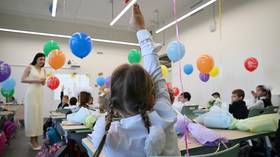russia today - 7/21/2025 9:45:18 AM - GMT (+3 )

Russians have spent more than 1.5 billion rubles ($17.6 million) on Labubu toys this year, according to data from e-commerce platform Wildberries & Russ, cited by TASS.
Created by Hong Kong designer Kasing Lung for his book ‘The Monsters’, the small elf-like character with sharp teeth became a global collectible sensation after Chinese company Pop Mart launched it in blind box format in 2019. Its popularity surged in 2024 when Thai-born K-pop star Lisa shared photos of the dolls on Instagram, triggering a wave of celebrity endorsements. Singer Rihanna was later seen with one clipped to her Louis Vuitton bag, Kim Kardashian displayed a collection of ten figures, and former England football captain David Beckham posted an image of a Labubu gifted by his daughter, making the toy an international trend.
Although Labubu-themed products appeared on Wildberries in July 2024, the company said sales remained negligible until May this year, when demand jumped by 4,700% compared to April, reaching tens of millions of rubles.
“The popularity of the toys continued to grow in June: Labubu sales set a new record – compared to May, turnover increased by another 1,190% and almost reached 1 billion rubles ($11.1 million). As of today, total sales of Labubu products on Wildberries (since January 1) have amounted to 1.582 billion rubles ($17.6 million). On average, every tenth Russian has bought Labubu on Wildberries,” the company told TASS on Sunday.
The surge in popularity of Labubus has sparked debate among Russian lawmakers. Ekaterina Altabaeva, deputy chair of the Federation Council Committee on Science, and MP Vitaly Milonov have both urged a ban, citing the toys’ “monster-like” appearance and potential harm to children. Another legislator, Tatyana Butskaya, warned that many of the items lack proper labeling and called for tighter regulation.
State quality watchdog Roskachestvo said the figures meet safety standards and described Labubu as a “kind, toothy elf.” Pediatric specialists argue there is no evidence of psychological risk, emphasizing the role of parental supervision.
read more




